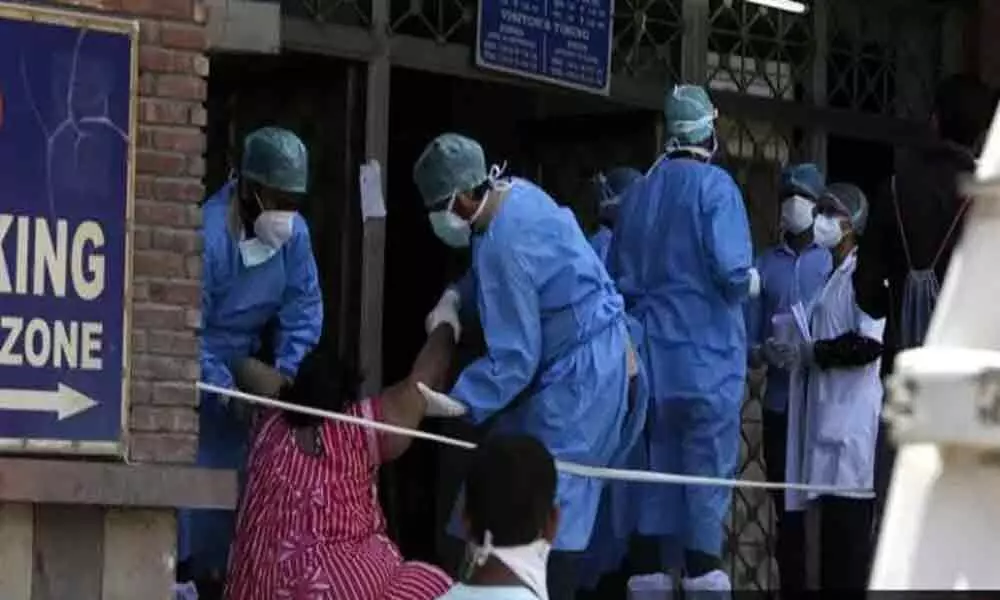Second wave of coronavirus to hit Delhi, not big as first one, say experts
Share :

Volunteer helps COVID-19 patient at hospital
Coronavirus in Delhi: Delhi was hit by a sharp first wave of coronavirus, which confined people to their homes, closed businesses and forced a drastic change in their lifestyle.
Coronavirus in Delhi: Delhi was hit by a sharp first wave of coronavirus, which confined people to their homes, closed businesses and forced a drastic change in their lifestyle. The dip in the curve of new infections on a daily basis at an aggregate level seems to be offset to an extent and it appears the first wave may be over.
The second wave will not be massive like the first wave of what we saw in Delhi for example, and it will be quarter to the tenth in size, said Professor Karl J Friston, Scientific Director Wellcome Trust Centre for Neuroimaging Institute of Neurology, University College London, UK.
Speaking at Covid-19 modelling webinar series organized by Indian Institute of Public Health, Gandhinagar, Friston, citing his mathematical model, said "We don't have to worry too much about the second wave; the simulations suggest the second wave of coronavirus may not be bigger as the first wave by far, it will be much smaller second wave."
He added that in his opinion, the main worry is that the second wave can come in the northern hemisphere in winter and get confounded with seasonal influenza. "The second wave will not be a massive first wave, what we saw in Delhi for example. It will be a quarter to the tenth in size of that", added Friston.
Responding to a query on a mathematical model predict when an epidemic will end or slow down in a particular country, Friston said the time constant for some countries of the first wave and possible second wave is in the order of 6 months, and cited the example of the UK, Spain, and Italy. "It looks longer for Brazil, US and India, which means your end may be several months or may be a year after the end of the European experience", he added.
Queried on his mathematical model citing 80 per cent of the population is immune to Covid-19, Friston said "I think if you accept and commit to this notion of heterogeneity on the basis of the evidence, then half of the population at this stage hasn't yet had to deal. Each country starts off with an epicentre usually in a high density city and high transmission scenario, and that slowly spreads to other cities."
He added, "At the beginning the countries at the outbreak, if two or three major cities were infected then we could say that 80 per cent of the population was yet to experience the epidemic. For India, 40 per cent or possibly 30 per cent of the population is yet to get infected."
Elaborating on the aspect of immunity in the people against the viral infection, Friston said one of the key parameters is the effective loss of immunity therefore in the short term and cited the sharp first wave in Delhi or London. "Month by month the loss of immunity, on how long small and crucial part of the population who are immune and more importantly, how quickly this proportion declines overtime", added Friston.
He insisted that the slow erosion of immunity may occur in three to six months, and citing his mathematical model said the second wave in the UK may occur around Christmas or shortly after Christmas. "If the order of immunity is for 32 months or several years, then the second wave will be pushed further and further into the future, or the limit may not occur, and if does occur when there is effective vaccine around", said Friston.
He elaborated that at the moment there have been provisional attempts to examine the UK and Germany -- as they have the same climate, geospatial conditions and same number of people -- yet fatalities in Germany were extremely less in comparison with the UK.
"Population density has a big effect on transmission, the bigger question is the difference between Europe and India, Brazil, where damage seems to be much more protracted. In Brazil and the US the full shape or transient of the first wave has not yet revealed itself," he added.







